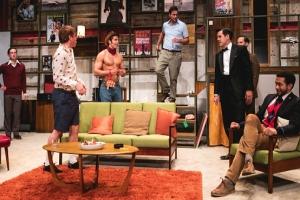Review of The Boys in the Band revival at the Park Theatre
This production has transfered to the Vaudeville Theatre from 7 February 2017.
With Mart Crowley's landmark play The Boys in the Band context is everything. Written and set in 1968, the year before the Stonewall riots in New York City, it explores a period of time that is maybe difficult to relate to for a contemporary audience, gay or otherwise, thanks in part to the progressive nature of political and social change in both the UK and USA since that period. Whilst stage drama has effectively explored the issues surrounding the AIDS crisis from Larry Kramer's The Normal Heart and Tony Kushner's Angels in America, to name but two of the most famous examples, Crowley's acidic yet intensely likeable comic-drama explores a more innate, timeless and less talked about issue within the gay community, that of self-loathing and internalised homophobia.
"Show me a happy homosexual and I'll show you a gay corpse" spouts the character of Michael, our evening's host who has brought together his friends to celebrate the 32nd birthday of the icy and distant Harold in a swanky New York loft apartment. There's almost a checklist of stereotypes from the swishy Emory to the overly earnest Donald and the self-deprecating Bernard who allows himself to be the but of numerous "Uncle Tom" jokes alongside couple Larry and Hank who struggle to stay on the same page when it comes to their views on monogamy. Michael's hopes for a celebratory evening are dashed however at the arrival of his old college roommate Alan, whose homophobia demands the group attempt to play it straight but instead leads to a confession of his own.
The first act certainly feels comfortably familiar with some postulating between Ian Hallard's well controlled Michael and Daniel Boys' restrained yet interesting Donald. Their extended scene before the other guests arrive helps establish the status quo, which becomes particularly pertinent in relation to their relationships that range from casual encounters to life-long friendships. As the drinks are poured and the evening turns to a cruel game in which each person must telephone someone they are in love with and confess the fact the drama shifts in tone as each character is forced to vocalise and share their inner most vulnerabilities. As Clive Barnes remarked in his original New York Times review, the scene "makes Edward Albee's Who's Afraid of Virginia Woolf? seem like a vicarage tea party" as the group is reduced to petty misfires that still manage to hit under the skin.
Whilst this device feels slightly manipulative and comes almost out of nowhere there are touches of farce and Cowardian humour that ensure the piece remains light and connected to the audience, with bitchy asides and commentary finding humour beneath the superficial banter. Never overly weighty but occasionally profound, insults fly back and forth without caution with no topic seemingly out of bounds. The arrival of a stripper-gram style cowboy piques the interest of the assembled party and allows him to remain the but of many of the jokes and he becomes a sort of innocent observer to the proceedings, rarely offering any insight which feels like a wasted opportunity.
It's finely directed by Adam Penford who keeps the pacing consistent and the characters on the right side of believable - a difficult task in a text that juggles a number of overwhelming personalities that threaten to burn out far too quickly. Rebecca Brower's realistic design creates the appropriate atmosphere and brings the audience into a world where Hollywood icons act as a visual metaphor for our other selves matched with a firm time specific aesthetic that doesn't feel overly kitsch.
There's a set of fine performances from the company led by Ian Hallard's spiky yet deeply conflicted Michael who dominates the party and forcibly ensures his guests dance to his tune. Above all the noise I found Nathan Nolan's Hank the most interestingly presented character and his relationship with John Hopkins' tortured Alan and Ben Mansfield's Larry, his partner, the most convincing. There's a cool confidence in Mark Gatiss' Harold that renders him slightly underwhelming, but his pithy contributions do manage to cut through the wandering set of accents that could do with sharpening across the board.
Whilst the context of the play allows it to be considered as an important development in American theatre it can feel dated in its central message, yet through the language and the performance remains vitally entertaining. Crowley's normalisation of gay shame and self-loathing is amplified as it remains practically unquestioned, and despite the madness that the band has descended into the boys casually agree to meet up again the next day, and we become aware that this situation and discussion is far from being a one-off. Michael's overriding Catholic guilt ends the play with him going off in search of midnight mass, hammering home the play's central and divided issue that cuts through the comedy and allows the piece to transcend its context and make an effective mark on its contemporary audience. A finely judged revival of an important and entertaining drama.
Originally published on
